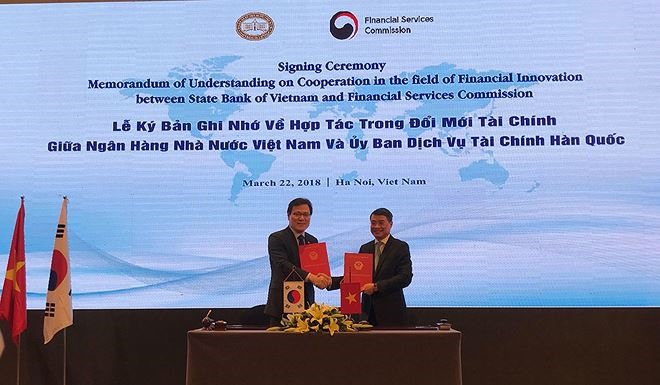 Economy
Economy

State Bank of Việt Nam (SBV) and South Korea’s Financial Services Commission (FSC) signed a memorandum of understanding on cooperation in the field of financial innovation in Ha Noi on Thursday.
 |
| State Bank of Việt Nam (SBV) and South Korea’s Financial Services Commission (FSC) signed a memorandum of understanding on cooperation in the field of financial innovation in Hà Nội on Thursday. — Photo tinnhanhchungkhoan.vn |
HÀ NỘI — State Bank of Việt Nam (SBV) and South Korea’s Financial Services Commission (FSC) signed a memorandum of understanding on cooperation in the field of financial innovation in Hà Nội on Thursday.
The signing is part of the Việt Nam-Korea Financial Cooperation Forum, which was jointly organised by the Vietnam Banks’ Association and Korea Federation of Banks.
This is the first agreement in this area that SBV has signed with a foreign partner, marking an important milestone to perfect the legal framework for comprehensive co-operation between the central bank and FSC.
The agreement is seen as a legal basis for the two sides to enhance exchange, share information and conduct co-operations contents related to the modernisation of the banking and financial system as well as application of modern financial technology in the operation of banking system and services.
Speaking at the forum, SBV Governor Lê Minh Hưng said the forum was very meaningful in the context of the strategic partnership between Việt Nam and South Korea, which had been continuously developing in the past few years.
The forum is an opportunity for the two sides to further understand the needs and potential in financial and banking co-operation in the coming time, especially in the time of the 4.0 industrial revolution that is opening up new development possibilities for the world in general and the banking sector in particular.
“Since the establishment of diplomatic relations more than 25 years ago, Việt Nam and South Korea has made remarkable progress in all fields, including politics, economics, trade, investment, culture and tourism,” said Hung.
In the banking sector, South Korea is among the top 10 countries and territories in Việt Nam with the highest number of credit institutions, including two banks, seven banking branches, six representative offices and two finance leasing companies.
Hưng said South Korean credit institutions had always been active, dynamic, efficient and law-abiding investors in Việt Nam and that they had made remarkable contributions to the development of economy, banking and finance in the country as well as in the co-operation between the two countries.
“The 4.0 technology revolution brings a lot of opportunities, creating added value and driving force for economic development. The banking and finance sector is the pioneer in adopting and applying the technology solutions to innovate and improve products and services, helping cut costs and bringing many benefits to customers,” Hưng said.
He, however, pointed out that the financial and banking system would face many challenges due to the replacement of machines and automation solutions, increase in competition from Fintech companies as well as new risks from the technological environment.
South Korea is a country performing well in science, technology and start-up innovation, being the cradle of Fintech development in Asia. As a management body in the Fintech sector, FSC has developed a number of policies to support the development of the sector.
Hưng emphasised that the co-operation was an inevitable trend to bring benefits to businesspeople, investors and citizens of the two countries. He hoped the relationship between Việt Nam and South Korea in general and in the banking and finance sector in particular would develop greatly in the coming time, especially in the field of innovation. — VNS




